
My Top 25 Favorite Moments in Classical Music (Part 1)
What MAKES a moment in a piece of classical music? Sometimes it's the result of careful pacing from a composer, the slow build to a powerful release. Sometimes it's about surprise, a sudden explosion, or even a sudden extinguishing of sound. Sometimes it's about a harmonic transition, where the music lifts off the ground or is brought down to earth. Sometimes it's the culmination of over an hour of effort, finally reaching the top of the mountain. Music lovers of all stripes often talk about their favorite moments in classical music, and a few weeks ago I got a message from Sam asking me what some of my favorite moments were in music. I realized that over 193 episodes of this show, I've often talked about my favorite moments in the pieces that I'm specifically covering that week, but I've never made a list so to speak of my top moments in classical music, and so this week, I'm going to attempt to do that. One of the reasons I've avoided this topic is because it's so difficult to set limits or boundaries around what moments I'll talk about. Should I do a top 10? Should I do a top 100? Top 500? Which composers should I be including, dead or living? How can I do this without forgetting a bunch of great moments and inadvertently angering people who think I've left one out? Well, I hope I've found a way. 25 of my favorite moments from 25 different pieces, representing 300 years of music. This week we'll cover moments 1-15, with music from Bach to Rebel to Beethoven to Tchaikovsky and much much more. Join us!
27 Apr 202352min
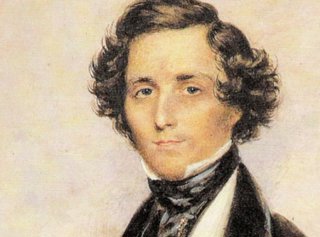
Mendelssohn Octet in E Flat Major, Op. 20
From 1825-1827, Mendelssohn wrote 3 of his most beloved and most played works: his Midsummer Night's Dream Overture, his String Quartet, Op. 13, and the piece were going to talk about today, his Octet. What is truly astonishing about these three pieces is that they were all written before Mendelssohn turned 18 years old. Mendelssohn was the greatest prodigy in the history of Western Classical Music, writing music so spectacular at such a young age that it almost overshadows his later, more mature, works. In my opinion, the greatest of these three towering early pieces from Mendelssohn is his octet. It is a piece of structural perfection, ingenuity, innovation, and most of all, it is a piece of such youthful enthusiasm that it is impossible to not put a smile on your face. We'll talk all about this piece today, from its soaring first movement, to its contemplative second movement, the brilliant third movement, and the bubbling last movement. Let's discuss this miracle of a piece together - join us!
20 Apr 20231h 3min
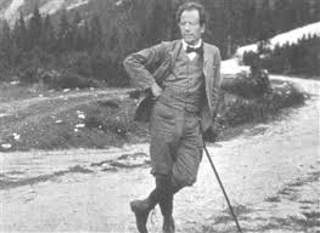
Mahler Symphony No. 5, Part 2
I left you last week after Part 1 of Mahler's 5th symphony, dazed and defeated. There seems to be no hope, and no way out. But as many of you know by now, Mahler reaches for the entire emotional spectrum in his music, and what Mahler builds out of the ashes of the first two movements is a complicated, difficult, and fascinating Part II, and a warm, sunny, and loving Part III. Part II is a single movement, a massive 17 minute scherzo that serves as a bridge to Part III and also is practically a full piece on its own. Part III of course contains the famous Adagietto, a love letter that leaves the listener full of questions that Mahler attempts to answer in the 5th movement, a sunny romp and the most unquestionably cheery movement that Mahler ever wrote. Why does Mahler build the symphony this way? How does a performer or an audience member deal with these hugely varied emotions? And how does Mahler build his complicated scherzo, his apparent love letter to Alma, and his both highly unusual and highly traditional Rondo 5th movement? Join us to find out!
13 Apr 202348min
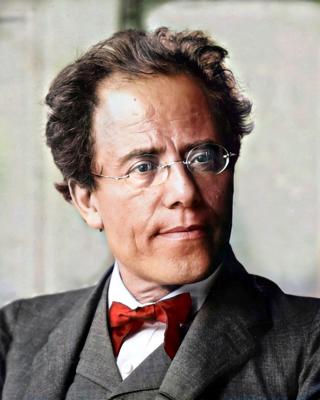
Mahler Symphony No. 5, Part 1
There is a thread of musical theory called Schenkerian analysis, based on the work of Heinrich Schenker. Schenker believed that musical works could be boiled down to their fundamental structures and harmonies. Entire works could be described with single chords. If Schenker had applied his analysis to Mahler's 5th symphony, he might have played just two chords for you: a C# minor chord, and then a D Major chord. The reason why? Over the course of 70 minutes, Mahler takes the listener on a wild journey, starting in C# minor with a lonely military trumpet, and then ending in a glorious D Major coda that might be the most unambiguously sunny thing Mahler ever wrote: But of course, how we get there is the most fascinating part of this monumental symphony. Today, on Part I, I'm going to take you through Part I of the symphony, which encompasses the first two movements. Next week, we'll take a look at Parts 2 and 3 together, which take up the final three movements of the piece. Part I of the piece represents both a shift in Mahler's music, and a nostalgic remembrance. As always with Mahler, there are multiple meanings to every phrase. The opening of the symphony, which sounds so unusual, is itself based on a seemingly random moment of the 4th symphony. The funeral march that dominates the first movement is based at least partly on a piece he was writing at the same time, the Kindertotenlieder, or Songs on the Death of Children. And the second movement, one of the most unusual and complicated movements Mahler had ever written up to this point, quotes a motive from Schubert's Death and the Maiden string quartet. Clearly, death, a specter that always haunted Mahler, is alive and well in Part 1 of the symphony. The first two movements of the symphony might be a perfect distillation of Mahler; they are passionate, wild, intense, but also tightly scored, precisely structured, and full of that constant push and pull between the past, the present, and the modern, that makes Mahler's music both a product of its time, but also music that is always relevant to us. Join us!
6 Apr 202357min
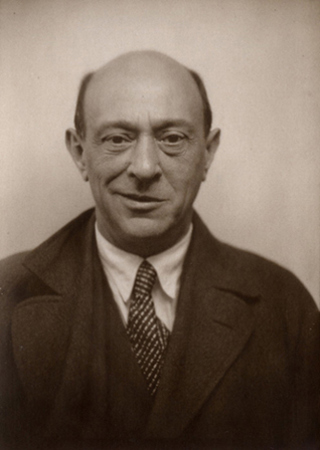
Schoenberg: Verklärte Nacht
I'm not sure there's ever been a composer who changed as much throughout his or her life as Arnold Schoenberg. Schoenberg would become famous, or infamous, depending on who you talk to, for his invention of atonality; the equalization of all keys so that the system of harmony that had been followed, in one way or another, in Western music for nearly a thousand years, was banished. This invention radically changed the course of contemporary classical music, and it remains controversial to this day. Some people think Schoenberg ruined classical music forever with this invention, while others say he liberated it from convention. But all of these inventions were in the future for Arnold Schoenberg when he wrote his Verklarte Nacht, or Transfigured Night, for string sextet. This piece, written in just 3 weeks in 1899, is hyper-Romantic in every sense and burning with passion and yearning, as well as being almost hyper tonal throughout. It is based on a poem by the German poet Richard Dehmel called Transfigured Night and is an example of a composition that is inextricably linked to the text it was based on, despite the music being wordless. Almost every moment in the score can be linked to a line of Dehmel's poem, which is just as full of passion and yearning as the music. So today I'll take you through the piece and the poem in parallel, showing you the links between the two, and also trying to pick apart the remarkable complexity within Schoenberg's writing, all of which serves to whip up one of the most emotionally dramatic and compelling pieces of chamber music ever written. If you've ever been a skeptic of Schoenberg, this just might be the piece for you. Join us!
30 Mars 202357min

What Does an Opera Director Really Do? W/ Tabatha McFadyen
Have you ever wondered what exactly goes on behind the scenes putting together an opera? Have you ever asked yourself how a director make decisions on how to interpret the libretto of an opera? Why do some productions look so completely different to others? What is "regie theater" and why it is so controversial? Well, all of these questions and more are answered by my guest today, the fantastic director, performer, and writer Tabatha McFadyen, who takes us through the process of directing an opera from first commission to first performance, a process that can take a few years of work! This was a fascinating conversationa and I myself learned a lot from it. Join us!
23 Mars 202359min

The Life and Music of Clara Schumann
Clara Schumann, without a doubt, was one of the greatest pianists of all time. Schumann's playing didn't just leave critics and audiences in raptures, it also left other composers amazed that their music could sound so beautiful. Liszt called her the Priestess of the Piano, Chopin adored her playing, and Mendelssohn brought her over and over again to Leipzig to play concerts with the Gewandhaus orchestra. She toured practically her entire life while raising a family of 8 children, and taking care of her husband Robert, who dealt with a series of mental illnesses that ended in his tragic and untimely death. Simply put, Clara Schumann was a legend in her time. She was the first pianist to perform entire concertos and recital programs by memory, the first pianist to devote her work to both contemporary composers AND composers of the past, bringing Bach onto the recital stage. And on and on and on. But today I'm not going to focusing too much on Clara Schumann the pianist. I won't be mentioning Brahms or Robert Schumann all that much either, except in biographical details. That's because the focus of the show today is on Clara Schumann's compositions. She only published 23 pieces during her life, a result of many factors, but what we do have of her work shows a brilliant and underrated compositional talent. So today I'll tell you about Clara Schumann's turbulent and fascinating life story, and then take you through a few of her most wonderful pieces, including the piano trio and the 3 romances for violin and piano. We'll also talk about why her body of work is so small, and why what we have of her music is so precious. Join us!
16 Mars 202348min
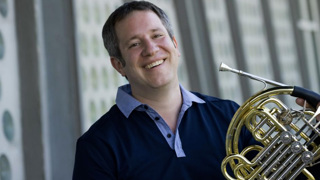
So What's It Like To Be The Principal Horn Of The Berlin Philharmonic? W/ Stefan Dohr
Stefan Dohr is one of the greatest french horn players in the world today. He has been the Principal Horn of the Berlin Philharmonic, one of the world's greatest orchestras, since 1993. In this really fun interview, Stefan and I talked about how he switched to the horn after starting out on the viola, his most memorable performances, what's it like to actually play in the Berlin Philharmonic, how to blend sound between the different sections of the orchestra, and much much more. Stefan is one of the most engaging and fascinating musicians out there so I think you'll get a lot out of this conversation. Join us!
9 Mars 202349min






















